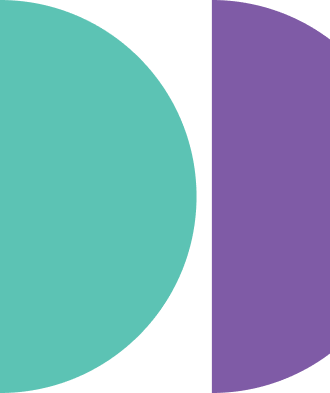By Adrian Moise, CEO & Founder of Aequilibrium
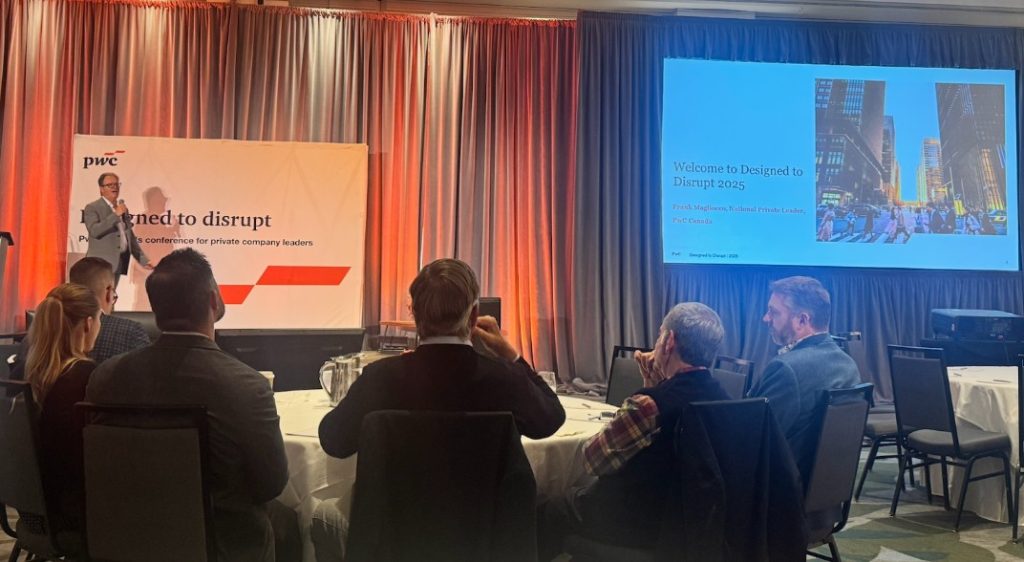
Last Friday, I had the privilege of attending Designed to Disrupt, an exclusive leadership event hosted by PwC Canada for some of the country’s most forward-thinking private companies. The event brought together business leaders, strategists, and innovators to explore what it truly means to bridge the gap between strategy and action in an era defined by constant change.
The theme of the day, “Closing the Execution Gap,” felt particularly resonant. At Aequilibrium (AEQ), we work every day at that intersection: helping organizations turn bold ideas into tangible outcomes through AI, extended reality (XR), and digital design.
Yet even for those of us immersed in transformation, the challenge remains clear: disruption has outpaced execution.
Below, I’ve captured the most powerful ideas and takeaways from each speaker and how they connect to AEQ’s mission to help organizations execute in the face of uncertainty and lead in the emerging AI economy.
1. Cara Cole (PwC): The Execution Gap – Turning Intent into Impact
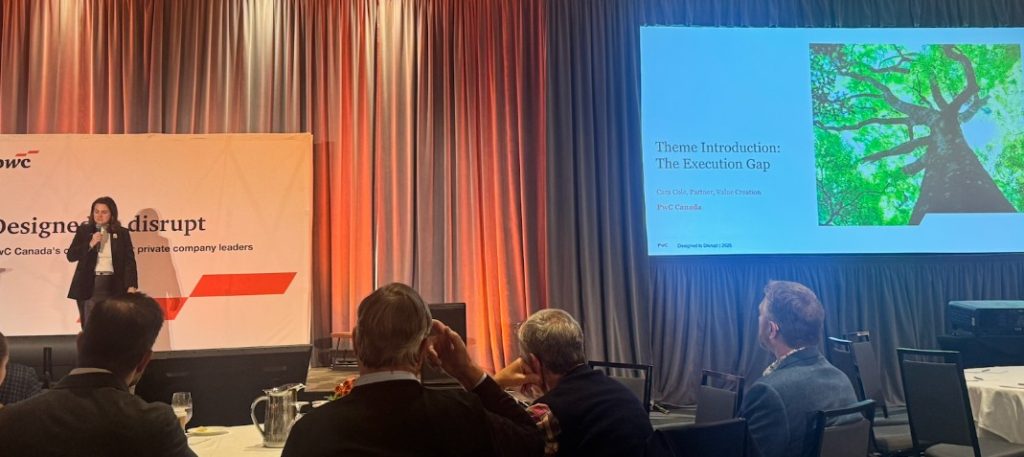
Cara Cole, Partner, Retail and Consumer at PwC, opened the day by setting the tone for the entire event. She spoke about the widening “execution gap”, the space between ambition and achievement that separates organizations with ideas from those with outcomes.
In a world where technological change, economic volatility, and shifting expectations collide, the difference between success and stagnation isn’t having the best strategy; it’s the ability to act on it quickly, consistently, and intelligently.
Cara reminded us that innovation fatigue is real. Organizations are bombarded with tools, trends, and technologies, yet many are paralyzed by choice. She challenged leaders to move beyond awareness into decisive action, asking themselves:
- How are we closing the space between insight and implementation?
- How do we build cultures that reward learning as much as results?
- How can we execute through uncertainty rather than wait for clarity?
Cara reflected on these questions by emphasizing decisive action, cultural transformation, and resilience amid uncertainty.
She explained that closing the gap between insight and implementation means turning ideas into measurable outcomes through the purposeful use of technology. Building cultures that reward learning as much as results requires curiosity, experimentation, and psychological safety. Finally, she urged leaders to execute through uncertainty with agility and trust, acting with clarity of purpose even when conditions remain unpredictable.
She framed the day’s goal beautifully: not to leave with all the answers, but to start the right conversations about action, a theme that echoed through every subsequent presentation.
2. Jennifer Charters (Microsoft): Becoming a Frontier Firm
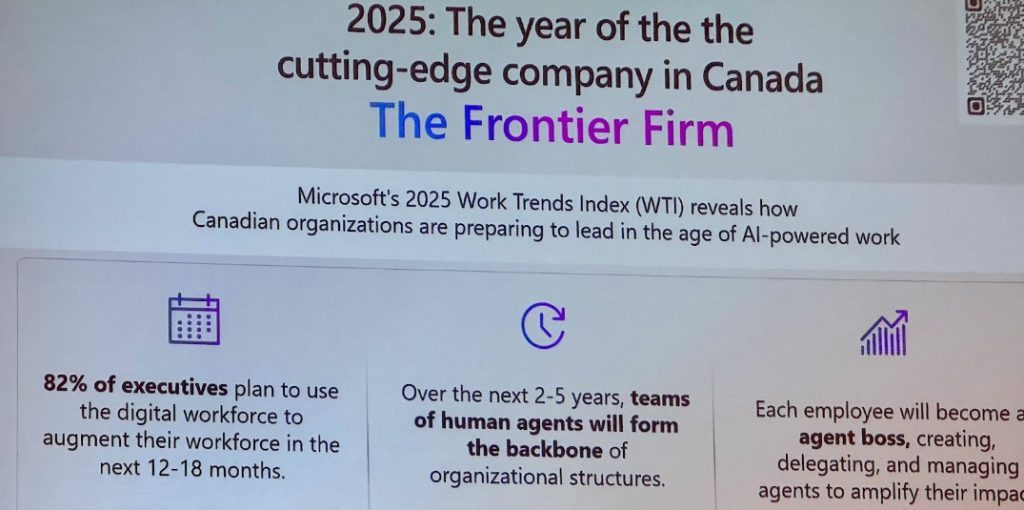
Jennifer Charters, Director, Cloud & AI Platforms at Microsoft, explored what it means to become a frontier firm, organizations that not only adopt new technologies but fundamentally reimagine their business models around them.
She described AI as a once-in-a-century platform shift, one that’s rewriting how we interact, reason, and create. Unlike past revolutions, AI’s accessibility, through natural language, voice, and visual interfaces, means that every employee can now engage with intelligent tools, not just engineers or data scientists.
Charters outlined three major shifts driving this revolution:
- AI as a Universal Interface – We’ve moved from clicking and coding to conversing. AI is now an intuitive collaborator.
- Memory and Context – AI can learn organizational patterns, retain history, and adapt its responses to your business reality.
- Reasoning and Planning – AI can simulate scenarios, recommend actions, and support decision-making at scale.
She predicted that within two years, most companies will have AI “digital co-workers”, agents capable of performing structured tasks, automating research, and even drafting communications. But the true advantage, she emphasized, lies not in the technology but in how leaders integrate it responsibly and strategically.
Becoming a frontier firm, Charters explained, means building three things:
- AI fluency across all levels of the organization.
- Governance and data foundations that ensure trust and compliance.
- A culture of experimentation where employees are encouraged to ask, “How could AI make this better?”
Her conclusion resonated:
“Lead in your market with AI, not as a technologist, but as a strategist.”
3. Danielle Gifford (PwC): Your Path to AI Adoption
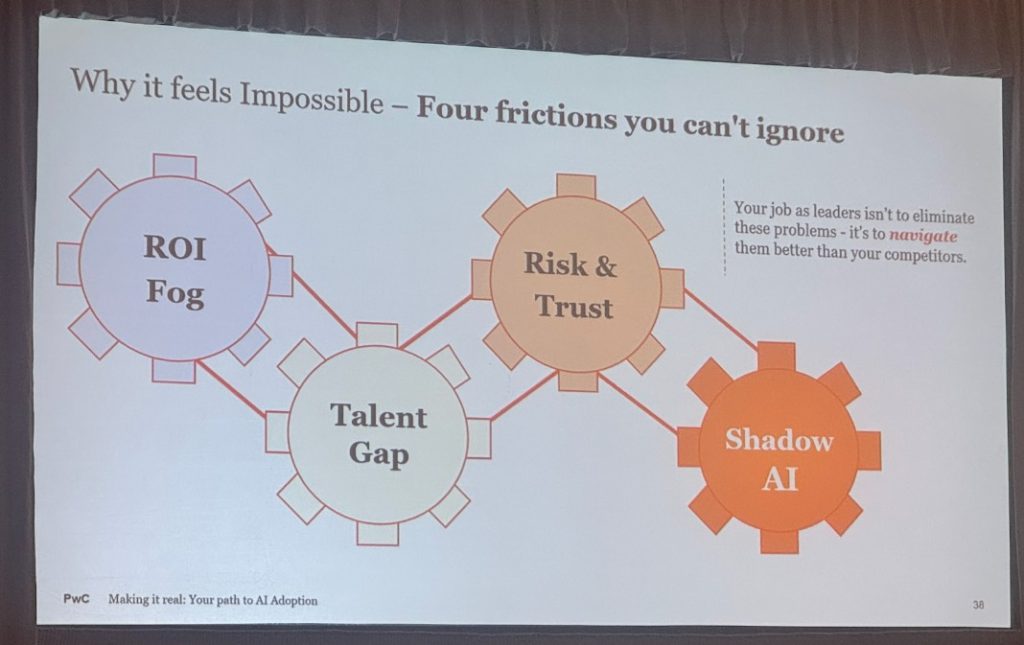
Danielle Gifford, PwC’s Managing Director of AI, delivered one of the most practical and grounded talks of the day. Her message: AI adoption doesn’t need to be overwhelming; it needs to be deliberate.
She began with two provocative truths:
- You’re not a tech company, and that’s okay.
- Don’t chase AI for AI’s sake.
Too often, she said, leaders jump into AI experiments without clarity on what problem they’re solving. They buy software before defining use cases or measuring ROI. The result? Disillusionment and stalled progress.
Gifford proposed a simple framework for turning AI from hype to habit:
- Start with small, measurable pilots, proof points that build organizational confidence.
- Focus on workflows, not projects, map how tasks really get done, and identify friction points AI can ease.
- Track both hard ROI (time saved, costs reduced) and soft ROI (employee engagement, customer satisfaction).
- Build an AI council or steering group that integrates governance, education, and experimentation.
She illustrated this with a case study of a real estate company that used AI-generated staging to replace costly physical setups, reducing turnaround time from 5 days to 1 and saving $400,000 annually.
Her closing thought captured the heart of modern transformation:
"You don’t have to become a tech company. You just have to use technology intelligently."
4. Mikaela McQuade (PwC): The New Economic Landscape
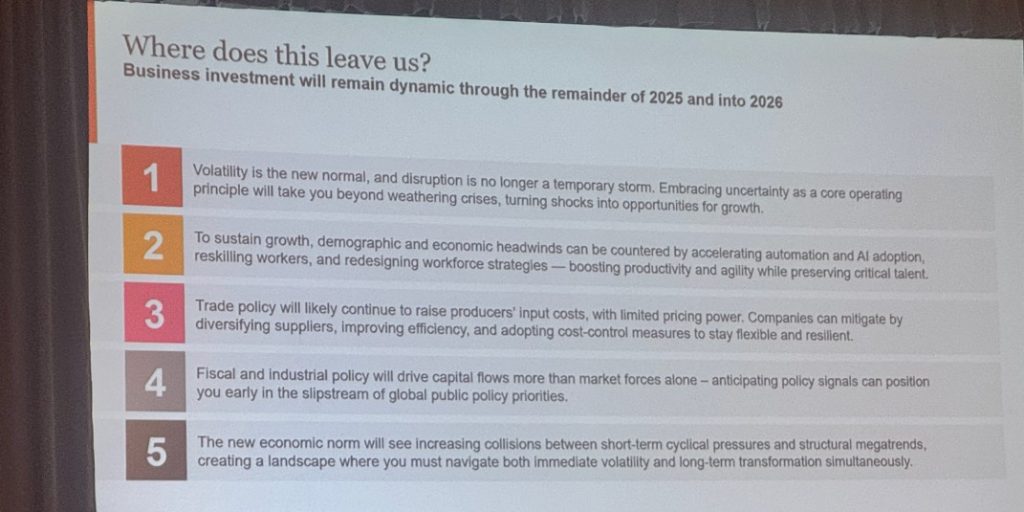
PwC’s Director of Geopolitical and Economic Insights, Mikaela McQuade, shifted the conversation from strategy to context. She reminded us that we’re living through structural, not cyclical, change. The global economy is being reshaped by demographic shifts, industrial policy, climate disruption, and the rise of AI.
While global growth remains resilient, it’s deeply uneven. Emerging economies like India are booming, while advanced markets like Canada face slower productivity and talent constraints.
Her stark observation: Canada’s productivity has declined 20% over the past decade, and output per hour now trails the U.S. by nearly one-third.
McQuade argued that AI could be Canada’s turning point, a potential new engine of productivity and competitiveness. But only if leaders move boldly and invest in the skills, infrastructure, and governance needed to adopt it responsibly.
She described five “megatrends” redefining the world:
- Climate change as a systemic economic force.
- Technological disruption from AI and automation.
- Demographic aging reshaping labor markets.
- Social instability as inequality and polarization rise.
- Geopolitical fragmentation as global supply chains regionalize.
Her key message:
"Volatility is permanent. Success now depends on agility, competing through uncertainty, not waiting for it to end."
5. Jack Newton (CEO, Clio): Real-World Lessons in Leadership
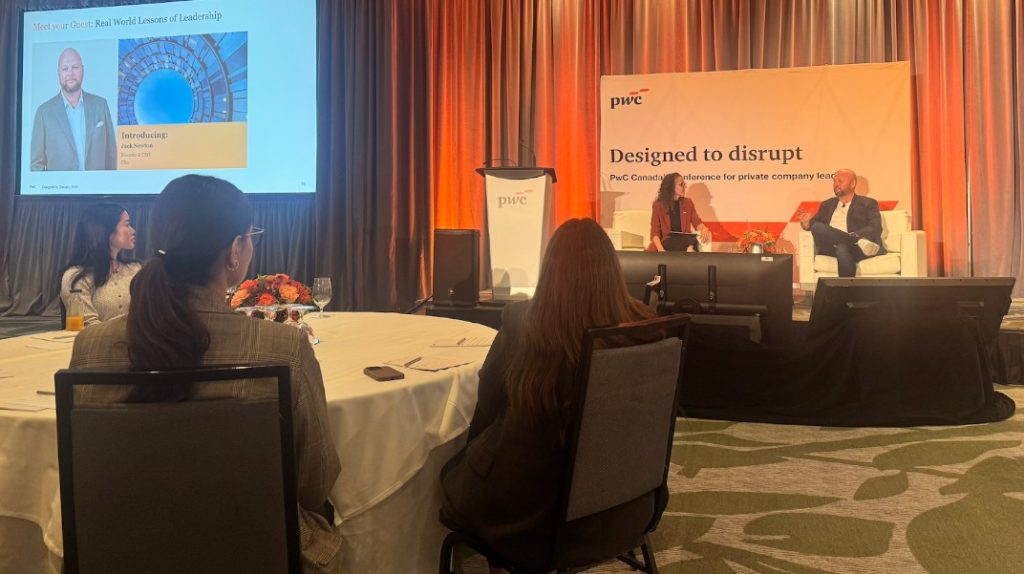
Jack Newton’s fireside chat was a masterclass in leading transformation from the inside out. As CEO of Clio, one of Canada’s most successful legaltech companies, he shared what it truly takes to embed AI and innovation into a company’s DNA.
At Clio, AI fluency is not optional, it’s an expectation.
Employees are evaluated not just on output, but on how effectively they leverage AI tools in their roles. Newton calls this “digital leadership”, the ability to orchestrate human and machine collaboration for better outcomes.
He offered vivid examples:
- AI assistants that analyze 17 years of customer service data to improve client experience.
- Financial tools that summarize board reports and even generate management podcasts.
- Engineering teams achieving 30–50% productivity gains using AI copilots, equivalent to adding 100 developers without expanding headcount.
But his deeper message was about culture and trust. AI doesn’t replace human value; it amplifies it. For Clio, success has come from combining clear vision with empowerment:
“Leaders must repeat their vision until they’re sick of saying it; only then has it started to sink in.”
He also spoke of AI ethics and responsibility: in the legal sector, trust is everything. Clio’s commitment to data integrity, transparency, and responsible AI isn’t optional; it’s existential.
6. Amanda Lang (CTV): The Beauty of Discomfort
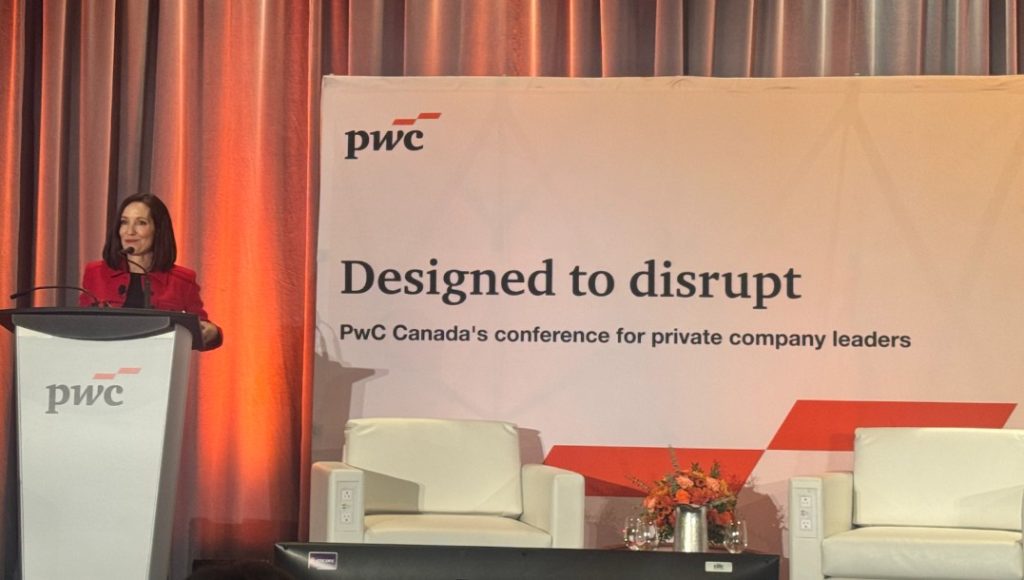
Amanda Lang, Chief Financial Correspondent at CTV, closed the event with a deeply human perspective. Her keynote, “The Beauty of Discomfort,” was a reminder that in a world obsessed with efficiency, curiosity and discomfort are our greatest assets.
Lang explored how our brains are wired to avoid uncertainty, even though discomfort is where growth and innovation occur. From childhood, we’re taught to stop asking “why”, to seek the right answer quickly. But progress, she argued, depends on asking better questions and being willing to sit in the ambiguity.
She challenged leaders to:
- Reignite curiosity in their organizations by rewarding questions, not just answers.
- Slow down decision-making long enough to test assumptions.
- Reframe discomfort as a signal of learning, not failure.
Her message was profoundly simple:
“Humility is just curiosity, it’s the willingness to say, ‘I might not have the answer.’”
Insights That Defined the Day
Throughout the day’s discussions, a unifying insight emerged: thriving amid disruption requires courage and decisive execution.
Each speaker brought a unique perspective, from strategy and innovation to trust, adaptability, and curiosity. Together, their insights revealed a common truth: success in the age of disruption depends on the courage to act.
The real differentiator in today’s AI-driven world isn’t technology itself, but the leaders who have the courage to act on it, while aligning it to their business goals.
From Vision to Impact: Shaping What’s Next
At AEQ, we believe innovation only matters when it drives execution. “Designed to Disrupt” reaffirmed our mission to help organizations bridge the gap between strategy and action, turning AI and immersive technologies into real-world transformation. We build resilient systems that thrive amid uncertainty, empowering teams through AI and XR while connecting human empathy with digital intelligence. Let’s shape the future together, where innovation truly meets impact.
This vision drives our global engagements, from exploring AI fluency and experimentation in Stockholm (read here) to championing intentional AI adoption at the Operational Member Experience (OME) Conference in Phoenix, Arizona.
Across every stage, we help clients move from idea to outcome and from efficiency thinking to optionality thinking, aligning technology with purpose to deliver measurable value and human impact.
Connect with Aequilibrium to co-create what’s next.



